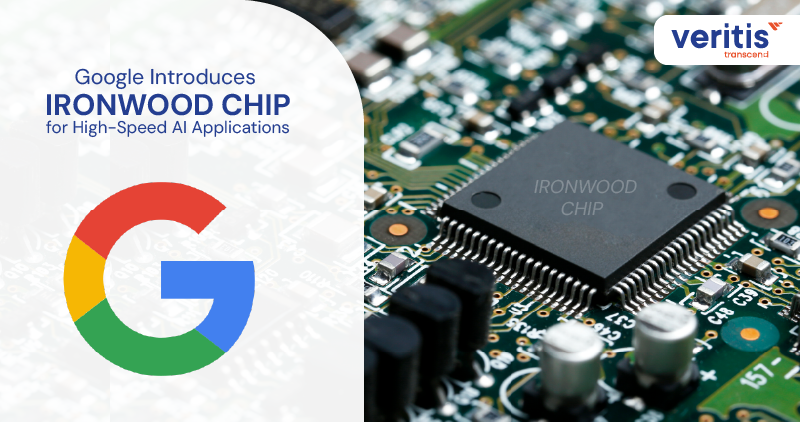
Alphabet Inc. has officially launched Ironwood, its latest and most powerful artificial intelligence (AI) chip, and the seventh-generation Tensor Processing Units (TPUs) designed by the company. Ironwood was recently launched at a Google Cloud event explicitly designed for AI inference performance, and the chip is above performance. This timing is crucial since, during this stage, actively trained models are deployed to produce outputs, such as responding to the user through a chatbot, generating AI-generated content, etc.
Accelerating AI Inference at Scale
By artificial intelligence engineering, Ironwood can meet the rugged computing requirements of generative AI applications like ChatGPT. It is a specific inference chip that quickly executes highly complex operations to provide real-time intelligent responses. Unlike previous TPU generations divided into training and inference, Ironwood combines both faculties into a single chip to enhance flexibility across different models and simplify Google’s AI infrastructure.
Designed for Performance, Scale, and Efficiency
The new Ironwood chip promises improved on-chip memory, which is crucial in running large models with the lowest possible latency. It can fit into clusters up to 9,216 chips strong, making it capable of powering some of the largest AI workloads in the world.
According to Amin Vahdat, VP of Systems and Services Infrastructure at Google Cloud, Ironwood provides twice the performance per watt of its predecessor, Trillium, which debuted last year. This makes it faster and much more energy-efficient, becoming increasingly critical as AI deployments expand and become more complex.
“It’s just that the relative importance of inference is going up significantly,” Vahdat said.
Supporting Google’s AI Ecosystem
Google uses TPUs such as Ironwood to run models like the Gemini series while offering access through Google Cloud. Ironwood is, however, not available for use to the public, unlike Nvidia’s GPUs, and it strengthens the hardware-software ecosystem across the Google integrated systems. The chip manufacturer is undisclosed, but then it symbolizes that Google continues its endeavor toward custom AI silicon to compete in the new world of AI.
What Is Ironwood? A Technical Overview
Ironwood is the seventh generation of TPUs engineered precisely for AI inference. These pre-trained models can make predictions, generate text or images, and communicate with users in real-time.
Key Technical Highlights
1) Inference Optimization
Ironwood is fine-tuned for running AI models, making it ideal for use cases such as:
- Natural Language Processing (NLP)
- Generative AI (text, images, code)
- Recommendation engines
2) Massive Scalability
It can run in clusters of up to 9,216 chips, thus enabling global-scale AI infrastructure and a vast range of models.
3) Unified Architecture
With improved on-chip memory and architectural upgrades for greater flexibility and throughput, this new generation is truly the trump card, combining all the strengths from earlier TPU variants (training and inference).
4) Energy Efficiency
The power-to-watt ratio is 2x faster than the Trillium chip, thus offering a balanced trade-off between power consumption and the speed required for sustainable AI scaling.
5) High-Bandwidth Memory
Larger memory provides the benefit of increased throughput, thus helping to minimize bottlenecks. This, in turn, enables faster inference by highly complex models.
6) Cloud-First Access
Ironwood is not a stand-alone product; it can be accessed via the suite of Google Cloud services, including Vertex AI and other enterprise-grade AI tools.
Conclusion
This chip is part of the Google Ironwood initiative, which has ushered the company into a new era of AI infrastructure. This model encapsulates all performance, efficiency, and scalability measurements in a single design. It is meant for high-scale inference and deployment. It strengthens one of Google’s capabilities in AI, adding cloud services to its profile while also making it a serious competitor with Nvidia. Ironwood promises to make future AI models faster, smarter, and more sustainable as demand builds.
Got Questions? Schedule A Call
Additional Resources:
- AI Maturity Model – A CEO’s Guide to Scaling AI for Success
- How AI Managed Services Optimize Cost, Efficiency, and Security
- DeepSeek AI – The Next Frontier in Artificial Intelligence Innovation
- Why Cloud Repatriation is Gaining Traction in Modern IT Strategy?
- Top 20 Use Cases for Blockchain in Cybersecurity